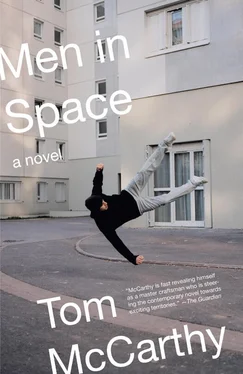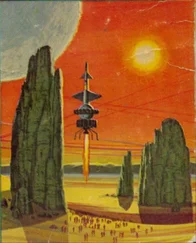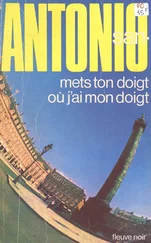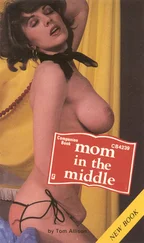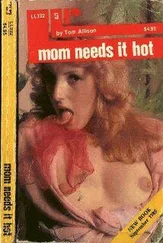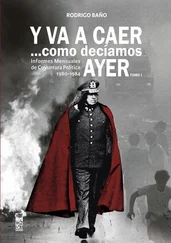“What was the magazine called?”
“ European Art, Art throughout Europe, Modern Art in Europe , something like that.”
“When you leave here, go and visit his French friend. Ask him. Try to think of anyone else who knows this Nick. Is he the one who I met outside …”
“Blatnička, yes.”
“You, Stefan: did you get an address for this Dutch person? A name?”
“Joost. J-o-o-s-t. No surname. No address. He’s going to send the paintings back to the mother, but that could be months away from now. Maybe they’ll sell at this show and he’ll send her money instead.”
“I wonder if the police know this as well. Oh — by the way: did you find out if we have any contacts in the police who’re on this case, or know about it?”
“Still working on that,” says Milachkov.
“Well, keep working. Work harder. Cheers.”
“Cheers.”
“Cheers.”
“Cheers.”
They raise their glasses to meet Ilievski’s, then quickly tip the liquid back into their mouths — all of it, in single throws. Swallowing, Anton winces: he’s never liked drinking this way. His eyes water and his chest burns. All four men set their empty glasses down and are quiet for a few seconds, as though they’d just drunk communion wine. It’s Ilievski who breaks the silence:
“Amsterdam. We have people there.”
* * * * *
Nick said to meet in the art-deco café, which Heidi’s never been to before but has heard about from Brad and Jeffrey, these two English teachers who think it’s cool that they go to weird, out-of-the-way Czech bars. This fact alone, that they consider it cool, makes it not cool. She has to get to the art-deco café so that Nick can give her back her glasses which apparently this Jean-Luc’s found, a mere — what, four weeks after she first lost them at his place; plus, so that Nick can give her some casserole dish he wants her to return to Ivan’s mother; plus, so that she can say goodbye to him. She’s on the concourse of the main station. Hlavní Nádraží . When the English teachers go out drinking after school, they clunk their glasses together and say Hauptbahnhof , because Cheers is Na zdraví which sounds like Nádraží which in German is … like, oh so fucking clever …
Nick told her the upper level, to the left, above the tunnel to the platforms. She rides the escalator, then finds a staircase leading further upwards. There’s a sign in Czech, German and even Russian, which is quite unusual: they’ve taken all the Russian signs down everywhere else and started putting English ones up instead — largely out of spite, she thinks, to confuse their old masters by changing the landscape on them like they did to that poor cosmonaut the gun-toting black queen was going on about back at the party. But this sign’s old school; it says Buffet, Bufet, Kape and it’s pointing up the staircase, so the café must be there. What is art deco anyway? It’s something older than pop art, and cubism — or maybe not older than cubism, maybe about contemporary; then there’s art nouveau which isn’t the same thing or is it? She wishes she knew, just knew and didn’t care that she knew, didn’t even know that she knew, the knowledge just in there, all mundane, like knowing that today was Tuesday or that you were twenty-two, twenty-three in March …
Heidi comes to the top of the staircase and finds herself on a landing: a long corridor whose floor is all mosaicked in two-tone, black and white, with large, curving windows a bit like in Jean-Luc’s atelier. It’s an older, grander world than the sordid station below with all its párek stands and sleazy guides touting for tourists, Gute Wohnung! English? You want room? — ugh, and those Gypsies huddled in rows with all their worldly goods in laundry bags with strings around them. She just saw two of them outside in the bushes next to the sliding doors taking a crap — that’s right, just shitting right there in the open. Heidi did that herself once, walking in the Rockies three winters ago with Hikesoc — North Face rucksacks, Salomon ice picks, the works: she remembers crouching down in the pure snow above a crevasse, right across the slit, then how it fell from her so cleanly to the ice floor twenty feet below, the kadunggg! when it landed reverberating round the walls … But that was different, virgin, clean, these Gypsies stink to heaven — though it’s not their fault, she knows, they’re persecuted, poor as fuck, but nonetheless they stink and that’s a fact.
The large windows face back across the main road that runs right above the lower concourse, back down towards Mústek and across to Staré Město. All the roofs, from this raised elevation, look kind of candy-like, all Disney’s Magic Kingdom: pointy church spires and sloping square roofs with gold tiles on them and round domes and weathercocks. At one end of the landing there’s a door that’s padlocked closed; the café must be down the other end, behind the swinging wooden door a man’s just come from. He looks like a businessman in his suit and his leather shoes which click-clack on the floor’s tiles as he walks towards her. He smiles, turns as he passes her and looks her up and down: her legs, her tits, which dream on asshole, not if hell froze over — although actually it just might at this rate, it’s so damn cold …
Nick, Mladen the real Yugoslavian and Nick’s friend Gábina who’s very beautiful and swung him the job at the art school — these three are sitting at a table on the far side of the café. It’s a tall, ornate room with cornicing around the ceiling and huge paintings of women on the walls — or, well, not paintings, but they’re glazed into the large ceramic tiles, the women, like a great big jigsaw so that each woman starts at about head height and goes up all the way to the ceiling, with her hair hanging down her back. So that’s art deco, then. Nick’s got three enormous bags, or one bag and one big green trunk and then a smaller bag and then a shopping bag as well; how’s he ever going to get all that shit out of the train when he gets to Amsterdam? They’re stacked up round the table, the three smaller ones on top of the green trunk, and this waiter’s saying something to Mladen as he walks by, pointing with his finger that he can’t get by to take stuff to the tables, which bullshit he can’t. The waiters are such assholes here in Prague: they’ll complain about anything and do anything just to be — what was the word she had to explain to her class the other day? Contrary . Nick’s looking away, laughing, ignoring the waiter; he must be glad he won’t have to put up with that crap any more. It’s Gábina who first sees Heidi as she’s walking up to them; she kind of starts, perks up and nudges Nick: Your friend’s here . Nick gets to his feet, sways slightly, takes her by the shoulders, kisses her hello on both cheeks, and oh boy has he ever been drinking, and not beer at that: it’s something sharp that rolls right from his mouth in waves of vapour. He says:
“I’m really glad you came. Hey, Mladen! Tell that guy to bring another round. Old Penguin there.” And he starts explaining how the waiter looks kind of like a penguin with his black-and-white suit, and the way he waddles if you watch him — which is true, he does, and Heidi says:
“His suit matches the black-and-white mosaic floor,” and Nick gets all excited and starts going on about this café he knew when he was a student:
“The floor was black and yellow. Black and yellow, right? You with me?”
And they all nod yes, so he continues:
“In big squares, black and yellow. It was called Brown’s, just to make things complicated. But the point is that the floor …”
Читать дальше
